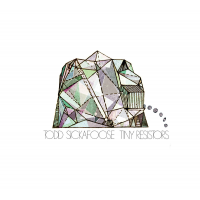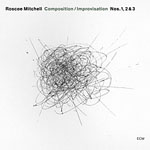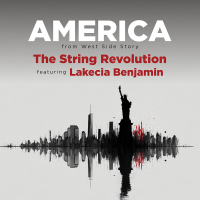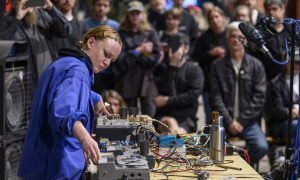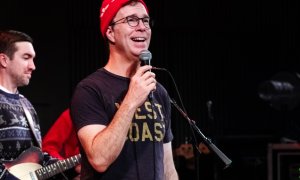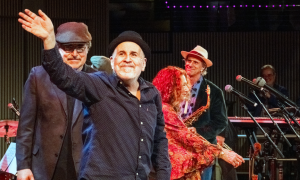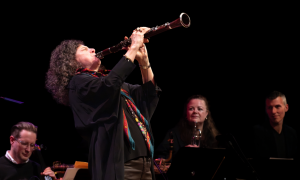Home » Jazz Articles » Live Review » Tomasz Stanko Quartet with Billy Harper at MoMA: Tribute...
Tomasz Stanko Quartet with Billy Harper at MoMA: Tribute to Krzysztof Komeda
Museum of Modern Art
New York City, NY
May 19, 2008
Starting last April, the Museum of Modern Art (MoMA) began running a series, called Jazz Score, celebrating original jazz composed for the scores of movies from the 1950s to the present. Pianist and composer Krzysztof Komeda (1931-1969) is represented by four films: Noz w wodzie (Knife In The Water), Le Gros e le maigre (The Fat and the Lean), Le Depart and Szlandar (Banner). While the first two were directed by Roman Polanski, the most famous Polanski/Komeda collaboration, Rosemary's Baby, is not being shown.
From the jazz point of view, Komeda was and still is highly influential far beyond his abilities as a player. Trumpeter Tomasz Stanko was part of Komeda's band almost from the very beginning, including the remarkable album Astigmatic (Power Bros reissue, recorded 1965). He has championed Komeda's music since that time, including recording Litania—Music of Krzysztof Komeda (ECM, 1997).
The concert on May 19 was a special part of the Jazz Score program, allowing both movie and jazz lovers a chance to hear Komeda's music brought to life by one who was there. Included in the band were Stanko's quartet, comprising pianist Marcin Wasilewski, bassist Slawomir Kurkiewicz, and drummer Michal Miskiewicz (which as a trio has released January (ECM, 2008) to high acclaim), plus guest saxophonist Billy Harper.
The hall, which holds between 400 and 500 people, has excellent acoustics, and was buzzing expectantly from the capacity crowd. Although the atmosphere of excitement was maintained after the first notes coming from Stanko's trumpet, the set took a little while to gel and get off the ground. "Ballada" (from Knife In The Water) is a very pretty, but low-key piece that does not particularly demonstrate Komeda's strengths as a composer.
The next piece, "Night-time, Daytime Requiem," however, contains every feature that makes Komeda's music so intellectually and emotionally satisfying. Deceptively simple, thematic fragments are linked together to build an arching line, and from there an arching section, and from there taking twenty minutes to unfold in a logical, whole manner. Ostensibly written for the death of saxophonist John Coltrane, it is not really a requiem, nor a homage, but a direct emotional expression expressing shock at the senselessness of his premature death. All the players gave everything they had, and by the time it ended, the magic of Komeda had taken hold.
"Ballad for Bernt" (written for saxophonist Bernt Rosengren and from Knife In The Water) followed this mini-opera, and allowed Harper to play openly on this beautiful theme. These three pieces all appear on Litania, and were followed by three shorter works, leading to the climax of the set, "Kattorna," which appears on Lontano (ECM, 2006), and also on Astigmatic.
Stanko and the band made clear their love of this tune, with its haunting, almost terrifying theme, which floats over a vamp that can be done in any of a number of rhythms, and indeed the mood and time-feel changed more than once. Everyone cooked, but especially Wasilewski, who seemed to be barely able to contain himself.
Individually, the performers were terrific. Stanko, never being a technical flame-thrower on the trumpet, has always chosen his notes carefully, and did so on this night. Harper, an interesting choice for the complementary single-line voice, came at the music from his own point of view, which was decidedly not European. However, using his sharp, direct tone, he got inside the human emotionality of Komeda, if not its "Polishness." The Wasilewski trio lives and breathes this music, considering it part of their heritage. Not only do they mesh extremely well as a unit, but each contributes a unique voice.
The audience was standing and cheering after the closing notes of "Kattorna," bringing the band back for an encore, which turned out to be the familiar and much-appreciated "Sleep Safe And Warm" from Rosemary's Baby, thus capping a near perfect concert.
Krzysztof Komeda's music can be found at Polish Jazz.
Tags
PREVIOUS / NEXT
Support All About Jazz
 All About Jazz has been a pillar of jazz since 1995, championing it as an art form and, more importantly, supporting the musicians who make it. Our enduring commitment has made "AAJ" one of the most culturally important websites of its kind, read by hundreds of thousands of fans, musicians and industry figures every month.
All About Jazz has been a pillar of jazz since 1995, championing it as an art form and, more importantly, supporting the musicians who make it. Our enduring commitment has made "AAJ" one of the most culturally important websites of its kind, read by hundreds of thousands of fans, musicians and industry figures every month.



